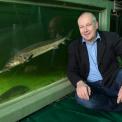
Sticklebacks | © David Ausserhofer/IGB
Fish are kept for scientific purposes in four different facilities on the IGB premises at Müggelseedamm 310. These include the aquaria hall, the roofed outdoor sturgeon facility, the greenhouse and the pond facilities. The species kept include native species such as trout, eel and sturgeon, as well as non-native species such as arapaima, clarias catfish and tilapia.
For the reintroduction of Baltic and European sturgeon into the Baltic and North Sea, we support the rearing of a parental stock and the release of juveniles into the wild. In addition to these conservation activities, sustainable food production in multitrophic, integrated production systems (fish-plant-insect) is another research focus of the Institute, where the potential of new species for aquaculture is also investigated. We also study the influence of genes on fish behaviour and the impact of fishing pressure on the behaviour and genetics of fish stocks.
Animal welfare
In our animal studies, we carefully balance the burden on the animals against the gain in scientific knowledge. We are committed to the 3Rs - Replace, Reduce, Refine: Wherever possible, we replace animals with alternative methods, reduce the number of animals used and minimise distress. The Animal Welfare Officer and the Animal Welfare Committee advise researchers on animal care and the design and conduct of animal experiments. IGB's facilities are monitored daily by trained professionals to ensure that they meet animal welfare requirements at all times.
















 To the top
To the top